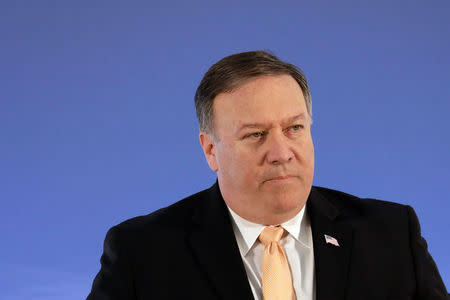Pompeo tells China continued North Korea sanctions enforcement needed

By David Brunnstrom WASHINGTON (Reuters) - U.S. Secretary of State Mike Pompeo has stressed to China the importance of continued enforcement of sanctions on North Korea to press it to give up its nuclear weapons, after warning of signs of backsliding by Beijing. The State Department said Pompeo had spoken to his Chinese counterpart Wang Yi on Thursday and discussed efforts "to achieve our shared goal of the complete, verifiable, and irreversible denuclearization of the Korean Peninsula." Pompeo reiterated that North Korea would have a bright future if it denuclearized and emphasized "the continued importance of full enforcement of all relevant UN Security Council resolutions related to North Korea," the department said in a statement. It said this was especially important when it came to preventing North Korea's illegal export of coal and imports of refined petroleum through ship-to-ship transfers prohibited by the United Nations. U.S. President Donald Trump, who held an unprecedented summit with North Korean leader Kim Jong Un on June 12 to try to persuade him to give up a nuclear weapons program that threatens the United States, urged continued sanctions efforts by Beijing last week and said the border between China and North Korea was "getting a little weaker now." U.S. officials have expressed concern that recent international engagement with Pyongyang could lead countries to relax sanctions pressure. Pompeo told a U.S. Senate hearing this week he had seen "modest" backsliding by China, North Korea's neighbor and main trading partner, which Trump has courted on the nuclear issue even while threatening a major trade war with Beijing. "We have observed China not enforcing control over their cross-border areas as vigorously as they were six or 12 months ago," Pompeo said. In April, the U.N. Security Council blacklisted dozens of ships and shipping companies over oil and coal smuggling by North Korea, including five based in China. On Wednesday, Japan's Kyodo news agency said Tokyo had alerted the U.N. about a suspected ship-to-ship transfer incident on June 21 involving a North Korean tanker in the East China Sea. Pompeo also spoke with South Korean Foreign Minister Kang Kyung-wha on Thursday to discuss the next steps on engagement with North Korea, the State Department said. It said they agreed on the need to maintain pressure until North Korea denuclearizes. On Thursday, the Financial Times quoted U.S. officials as saying that Pompeo plans to travel to North Korea next week for talks, but the State Department has declined to confirm this. Pompeo said last week he likely would go back to North Korea "before too terribly long" to try to flesh out commitments made at the Trump-Kim meeting. Trump has been criticized by security analysts for agreeing a joint statement in his summit with Kim that gave no details on how or when North Korea, which has rejected unilateral disarmament, might surrender its nuclear weapons. (Reporting by David Brunnstrom; Editing by Tom Brown)
